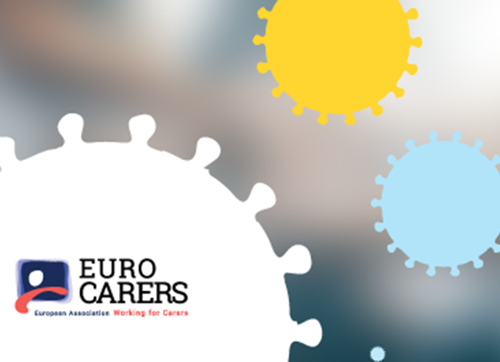FCI Joins Eurocarers’ Call For Immediate Action To Support Carers

Every day, millions of informal carers across Europe play a central part in the long-term care of people with a chronic illness, disability or other long-lasting care needs. They often do this unpaid and with minimal support. Many pay a high price for their caregiving in terms of negative health, social and employment outcomes. The COVID-19 crisis is visibly aggravating these effects and has made carers more isolated, vulnerable and invisible than ever before. On the occasion of its AGM, the Eurocarers network including Family Carers Ireland calls for immediate action to address their needs.
Family Carers Ireland’s new research report Caring Through Covid: Life in Lockdown provides a snapshot of the challenges and worries family carers in Ireland face in lockdown and outlines their suggestions as to how frontline service providers and Government could better meet their needs.
Caregiving can be one the most rewarding aspects of the human experience, but it may be one of the hardest too. From a philosophical standpoint, it consists in a selfless contribution to the well-being and quality of life of those in need of care – a beautiful concept. Yet, in today’s society, the burden of caregiving on informal carers is well documented – on their health and well-being, on their accessing or remaining on the labour market, on their ability to balance paid work with care, and on the socialisation and education of young carers.
Informal carers provide the lion’s share of long-term care in Europe today. According to some estimates, 80% of all care in Europe is provided by families, friends and neighbours. The value of informal care is not only a matter of finances: informal care is rooted in solidarity, a value which should be respected and nurtured.
As the community of carer organisations is documenting the impact of the COVID-19 crisis on carers and care models while formulating adequate responses to alleviate the burden of care, informal carers continue to be the backbone of care provision in the community. Many provide care to members of at-risk groups (or are part of these groups) and are at risk of catching the virus. As a result, carers are now providing even more support, under increased pressure to protect themselves from infection and prevent transmission to the person they care for. Carers have had to adapt quickly to the pandemic, often without guidance or personal protective equipment (PPE). Moreover, the confinement measures put in place in many EU countries may have further enhanced their isolation, caused distress and created challenging home situations.
At the occasion of their 17th AGM, on the 27th May, and against this backdrop, the members of the Eurocarers network including Family Carers Ireland reaffirm their commitment to convey the voice of informal carers at all levels of governance and call on EU institutions and member states to take immediate action to recognise and support informal carers.
Expected measures include:
- A clear policy commitment towards informal care as a choice rather than as a default option across Europe;
- The recognition of informal carers as essential partners in care and their access to the essential material (e.g. PPE), information and training they need to carry out their tasks;
- The provision of professional support services including respite care to all carers across Europe;
- The improvement of data collection about the prevalence of informal care and needs of carers as well as identification instruments;
- The development of prevention measures to offset the negative impacts of care (e.g. social protection for carers, access to education and employment, training and recognition of skills, health literacy, etc.)
- Resolute public investment in long-term care through the European Semester;
- The use of European funds to improve the quality of life of persons in need of care and of informal carers.
- Guarantee a systematic and meaningful dialogue with informal carers and organisations that represent them in policymaking processes.
Human dignity, human rights, solidarity and equality are among the core values of the EU. Informal carers should not have to face hardship as a result of their caregiving – instead, they should be celebrated!

